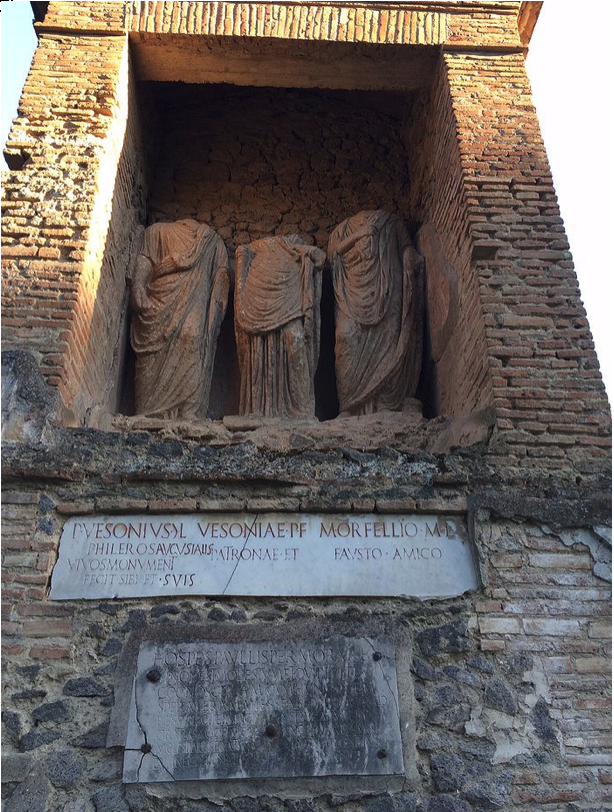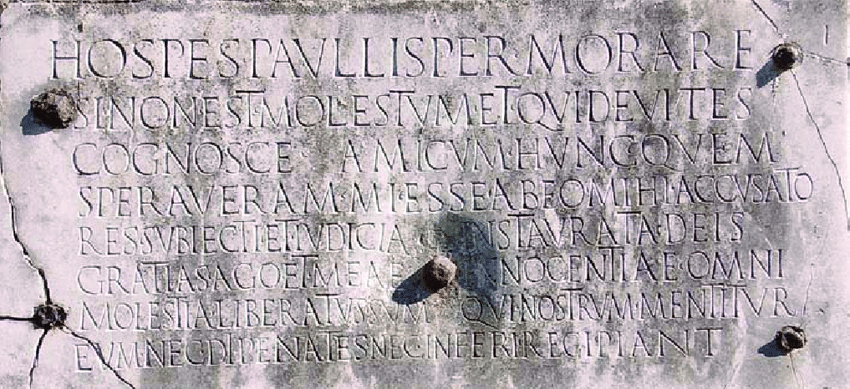1 The Phileros Monument (Année Épigraphique 1986.166)
The inscription mentions three people: 1) the freedman Publius Vesonius Phileros, who paid to erect the monument near the Nuceria Gate in Pompeii; 2) Vesonia, his former owner, whose name Phileros took when he was manumitted; and 3) the freedman Marcus Orfellius Faustus, Phileros’ onetime friend. The plaque below the inscription was added later and reveals a betrayal after the erection of the monument.
 |
 |
 |
| 1 | P. Vesōnius Ↄ (mulieris) L(ībertus) | 9 | Hospes, paullisper morāre |
| 2 | Philerōs Augustālis | 10 | sī nōn est molestum et quid ēvītēs |
| 3 | vīvos Monument(um) | 11 | cognōsce. amīcum hunc quem |
| 4 | fēcit sibi et suīs // | 12 | spērāveram mī esse ab eō mihi accūsātō- |
| 5 | Vesoniae P(ublī) f(īliae) | 13 | rēs subiectī et iūdicia |
| 6 | patrōnae et // | 14 | īnstaurāta. deīs |
| 7 | M(arcō) Orfelliō M(arcī) l(ībertō) | 15 | grātiās agō et meae <NAIL> innocentiae. omnī |
| 8 | Faustō Amīcō. | 16 | molestiā līberātus sum. quī nostrum mentītur |
| 17 | eum nec dī penātēs nec īnferī recipiant. |
Vocabularia
P. = Publius–ī m.: Publius (name) / Vesonius –ī m.: Vesonius (name) / lībertus –ī m.: ex–slave, freedman / Phileros –ī m.: to go or pass through /Augustālis –e: relating to the emperor Augustus, of Augustus, Augustan / Vesonia –ae f.: Vesonia (name) / Orfellius –ī m.: Orfellius (name) / Faustus –ī m.: Faustus (name) / paulisper: for a short while / molestus –a –um: troublesome, annoying / ēvītō –āre –āvī –ātum: to avoid, dodge / accūsō accūsāre accūsāvī accūsātus: to accuse / subiciō subicere subiēcī subiectus: to throw under, suborn, bring for action / īnstaurō īnstaurāre īnstaurāvī īnstaurātus: to build, perform / molestia –ae f.: trouble, annoyance / līberō līberāre līberāvī līberātus: to free / mentior mentīrī mentītus: to lie /Penātēs –ium m.: Penates, household gods /inferī –ōrum m.: the dead (those below) /
Interrogata
- Vesonius was clearly a man of considerable means. Why wouldn’t he rebuild the monument to reflect the new reality of his relationship with Orfellius?
- Think of a time a friend betrayed you or let you down. Was it important to you that others knew about it? If so, in what venues or media did you tell your side of the story?
Text
P. Vesōnius Ↄ(mulieris) L(ībertus) / Philerōs Augustālis / vīvos Monument(um) / fēcit sibi et suīs // Vesoniae P(ublī) f(īliae) / patrōnae et // M(arcō) Orfelliō M(arcī) l(ībertō) / Faustō Amīcō.
Hospes, paullisper morāre / sī nōn est molestum et quid ēvītēs / cognōsce. amīcum hunc quem / spērāveram mī esse ab eō mihi accūsātō / rēs subiectī et iūdicia / īnstaurāta. deīs / grātiās agō et meae <NAIL> innocentiae. omnī / molestiā līberātus sum. quī nostrum mentītur / eum nec dī penātēs nec īnferī recipiant.
Commentariolum
| 1 | P. = Publius, the standard abbreviation for the praenomen.
Ↄ (a reversed C) indicates that his former owner and patron (Vesonia) was a woman. / indicates a line break in the inscription |
| 2 | Augustālis: Phileros became one of the six priests of Augustus in Pompeii, a prestigious religious order of wealthy freedmen. Why do you think the word seems to be squeezed in on the inscription? |
| 3 | vīvos = a vernacular spelling of the nominative vivus. |
| 4 | Why do you think SVIS looks different from the rest of the inscription? |
| 9 | Inscriptions often addressed the reader. What effect does this have?
morāre: NOT morī < morior but an imperative form of moror -ārī (compare mora -ae f.) |
| 10 | quid ēvītēs: what mood is ēvītēs? Behold! An indirect question dependent on cognsoce. |
| 12 | ab eō = ā quō [= ā Faustō], refers back to amīcum hunc, “this man…by whom…”
mihi accūsātō-rēs subiectī [sunt] et iūdicia [sunt] accūsātō-/rēs: the word accūsātōrēs is split across the two lines. |
| 15 | a curse! <NAIL> a nail is driven into the plaque between meae and innocentiae; curses and oaths were often activated by the piercing the text of the curse or an effigy of the target. |
| 16 | quī nostrum: quī is indefinite, “whoever”; nostrum is genitive plural. |

